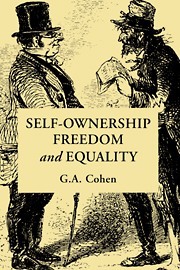Book contents
- Frontmatter
- Contents
- Preface
- Acknowledgements
- Introduction: history, ethics and Marxism
- 1 Robert Nozick and Wilt Chamberlain: how patterns preserve liberty
- 2 Justice, freedom, and market transactions
- 3 Self-ownership, world-ownership, and equality
- 4 Are freedom and equality compatible?
- 5 Self-ownership, communism, and equality: against the Marxist technological fix
- 6 Marxism and contemporary political philosophy, or: why Nozick exercises some Marxists more than he does any egalitarian liberals
- 7 Marx and Locke on land and labour
- 8 Exploitation in Marx: what makes it unjust?
- 9 Self-ownership: delineating the concept
- 10 Self-ownership: assessing the thesis
- 11 The future of a disillusion
- Bibliography
- Index of names
- Subject index
2 - Justice, freedom, and market transactions
Published online by Cambridge University Press: 29 August 2009
- Frontmatter
- Contents
- Preface
- Acknowledgements
- Introduction: history, ethics and Marxism
- 1 Robert Nozick and Wilt Chamberlain: how patterns preserve liberty
- 2 Justice, freedom, and market transactions
- 3 Self-ownership, world-ownership, and equality
- 4 Are freedom and equality compatible?
- 5 Self-ownership, communism, and equality: against the Marxist technological fix
- 6 Marxism and contemporary political philosophy, or: why Nozick exercises some Marxists more than he does any egalitarian liberals
- 7 Marx and Locke on land and labour
- 8 Exploitation in Marx: what makes it unjust?
- 9 Self-ownership: delineating the concept
- 10 Self-ownership: assessing the thesis
- 11 The future of a disillusion
- Bibliography
- Index of names
- Subject index
Summary
Whatever arises from a just situation by just steps is itself just.
(Robert Nozick, Anarchy, State and Utopia)In protecting property the government is doing something quite apart from merely keeping the peace. It is exerting coercion wherever that is necessary to protect each owner, not merely from violence, but also from peaceful infringement of his sole right to enjoy the thing owned.
(Robert L. Hale, ‘Coercion and Distribution is a Supposedly Non-Coercive State’)In this chapter, I consider more closely two topics that were introduced in Chapter 1: the relationship between justice in transactions and justice in their upshots, which is addressed afresh in section 1, and the charge that Nozick-style libertarians play fast and loose with the language of freedom, which is elaborated in sections 2 and 3. Finally, in section 4, I foreground a principle, that of self-ownership, which is, if I may be permitted the oxymoron, latently salient in the Chamberlain argument. The principle of self-ownership is at centre stage in the next eight chapters of this book.
I remarked on p. 21 of Chapter 1 that Nozick is so confident of the truth of the formula exhibited at the head of this page that he believes that he need but apply it, without arguing for it, to overturn end-state and patterned theories of justice.
- Type
- Chapter
- Information
- Self-Ownership, Freedom, and Equality , pp. 38 - 66Publisher: Cambridge University PressPrint publication year: 1995



